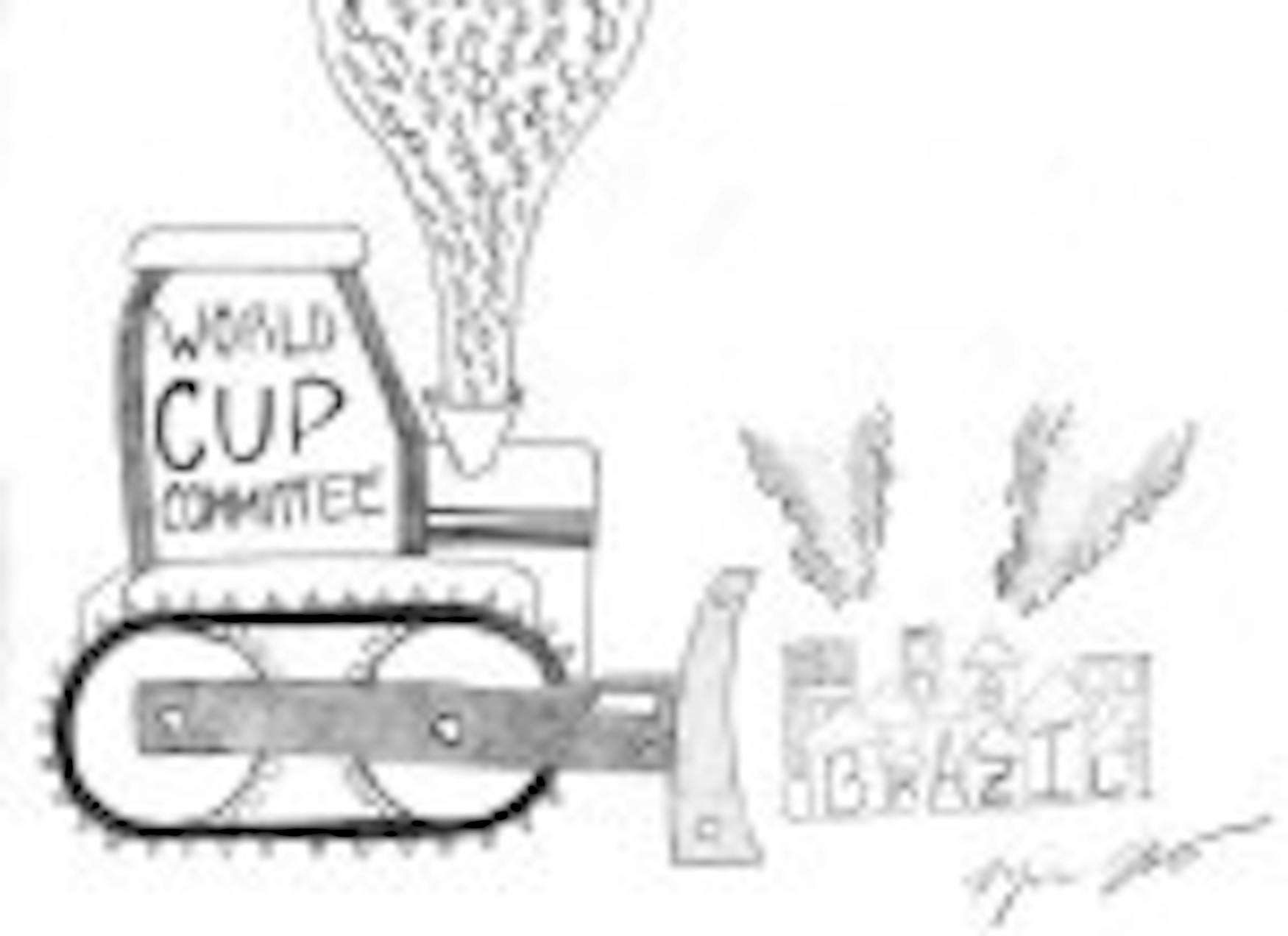Choose World Cup hosts with higher labor standards
Cynical Idealist
As soon as Spain scored the winning goal of the 2010 FIFA World Cup in South Africa, I started to get excited for 2014. Brazil, home of one of the world's most talented soccer squads, would be the host country. For the first time in FIFA's history of 110 years, back-to-back World Cups will have been hosted by non-European countries. As a soccer fan and a supporter of the Brazilian team, I was thrilled.
FIFA has a habit of giving tournaments to the highest bidder, and the fact that two developing countries got the hosting opportunity instead of Europe or the United States blew me away. And who wouldn't want to see soccer's most prestigious tournament played in the country that produced Ronaldo, Luis Fabiano, Robinho and Pele?
However, as June approaches, my excitement over Brazil hosting has considerably subsided. The World Cup is supposed to serve as a celebration of the world's favorite sport and, especially for a country like Brazil, an opportunity for development and economic growth. The latter is most certainly not happening.
The Brazilian World Cup is plagued by corruption, unsafe working conditions and skyrocketing costs. As of February 2014, the Brazilian government has spent nearly 15 billion dollars on the World Cup, as much as Germany and South Africa, the last two hosts, combined. Part of it could be due to Brazil's economic status, but South Africa is also a developing country and did not have these cost problems. There is currently no evidence that the current spending, which is already more than double projected costs, will actually positively impact tourism or international investment beyond the World Cup, unlike predictions made before Germany and South Africa hosted their respective World Cups.
It is also unlikely that Brazilian teams will even use some of the new stadiums, which are in more remote locations that do not have elite teams. Due to these rising costs and the fear that some stadiums won't be finished in time, the government has been especially lax when it comes to safety standards. As of Feb. 8, three workers died building the controversial Arenada Amazonia.
Since 2013, Brazilians have been protesting and rioting about many of the government's plans for the World Cup, especially plans about infrastructure and transportation costs. The current infrastructure projects mainly focus on hotels, which would only benefit tourists, and would raise the cost of bus and train fares for normal Brazilians. At least 10 billion dollars have been spent on these infrastructure changes, but very little of that money is benefiting Brazilians.
While Brazil is an emerging economic power, an estimated 11.5 million citizens live in favelas, urban shanty towns characterized by drugs, gang violence, police brutality and poverty. Citing safety concerns, the Brazilian government has authorized police raids in Rio de Janeiro and S??o Paulo to relocate nearly 15,000 families. There is little rhyme or reason over which neighborhoods get to remain in place and which stay: some favelas are offering themselves as cheap housing for tourists, while others face deadly riots and brutalities. The government claims that there is a policy of gentrification in place, but in reality, given that there is no sort of payment system for favela families, this gentrification is just another name for forced eviction.
Unfortunately, Brazil is not the only World Cup host to be less than ideal when it comes to government policy and work practice. Russia and Qatar were controversially selected to host the 2018 and 2022 World Cups, respectively. Russia has a pretty weak human rights record, as demonstrated by the jailing of Pussy Riot, continual abuse of the country's Muslim minority and the anti-gay propaganda law that effectively criminalized being openly gay. Qatar is not much better. The 2022 World Cup is nearly a decade away, but there have already been reports of laborers, many of whom were illegally brought over from Southeast Asia and the Philippines, being underpaid or not paid at all.
As a soccer fan, I want to celebrate the best teams in the world playing each other. As someone who identifies as a progressive, I am more than troubled. It is wrong that countries with abusive labor practices or egregious human rights violations are rewarded by the international community and get to host these extravaganzas.
Obviously, as an American, it is easy to decry the actions of Brazil and wonder why the government hasn't been better about safety and corruption. The United States and Western Europe can afford certain protections that a country like Brazil simply cannot. It is also easy to forget that the World Cup is giving Brazil a major chance to prove itself as an international player. But this doesn't mean American soccer fans should idly sit by and not be critical about the running of their favorite sport.
Sports fans must become more aware of the situation in many of these host countries. While it is hard to control a group like FIFA, and raising awareness is not going to solve every single problem Brazil, Russia and Qatar are facing, it might put pressure on domestic and international lawmakers to change policy. A country like Brazil that wants to be a major world player may be more open to reforms if it is clear Americans are paying attention.
It is fine to cheer yourself hoarse for your favorite team, but if fans are ignorant or choose not to acknowledge the problematic elements of a host country, it is unlikely that FIFA or host countries will have any incentive to improve how World Cups are hosted.
*



Please note All comments are eligible for publication in The Justice.